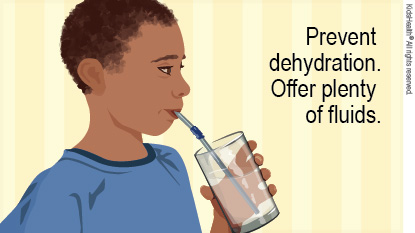Gastroenteritis: How to Care for Your Child
Gastroenteritis (also called the "stomach flu") is an infection that causes vomiting (throwing up) and diarrhea (watery poop). Many children also have a fever. Kids who have gastroenteritis lose fluid in their poop or vomit. This can lead to dehydration (not having enough water in the body). Keep your child hydrated by offering plenty of fluids.


-
Let your child rest as needed.
-
If your child throws up, give fluids:
-
Start with an oral rehydration solution (such as Pedialyte®, Enfalyte®, or a store brand). It has the right amount of water, sugar, and salt for kids, and you can buy it at drugstores or supermarkets without a prescription.
-
You also can give frozen electrolyte pops (such as Pedialyte® or a store brand), or broth.
-
Do not give your child juice, soda, or sports drinks. These have a lot of sugar, which can make diarrhea worse.
-
If your child is not throwing up, offer their regular diet as soon as they feel comfortable. It may take time for them to feel like eating solid foods.
-
Only change your child's diet if told to by your health care provider. You may need to remove some foods, like greasy or fried foods, from the diet. There's no need to avoid dairy unless it makes the vomiting or diarrhea worse.
-
Ask your health care provider if you should give foods high in probiotics ("good" bacteria), such as yogurt, to help with digestion.
-
You can give medicine for fever or pain if your health care provider says it’s OK. Use these medicines exactly as directed:
-
acetaminophen (such as Tylenol® or a store brand) OR
-
ibuprofen (such as Advil®, Motrin®, or a store brand). Do not give to babies under 6 months old.
-
Don't give aspirin to your child or teen. It's linked to a rare but serious illness called Reye syndrome.
-
Don't give medicines for nausea, diarrhea, or vomiting unless told to by your health care provider

Your child:

Your child:
-
can't keep fluids down without vomiting
-
has vomit that's bright green, red, or brown
-
has severe belly pain, or a belly that is swollen or hard
-
appears dehydrated; signs include dizziness, drowsiness, dry or sticky mouth, sunken eyes, crying with few or no tears, or peeing less often (or having fewer wet diapers)

What causes gastroenteritis? Gastroenteritis happens when a germ (virus, bacterium, or parasite) infects the stomach or intestines. Viruses are the most common cause of gastroenteritis in kids.
How can we prevent gastroenteritis from spreading? To help prevent the spread of gastroenteritis:
-
Teach all family members to wash their hands well and often. They should wash for at least 20 seconds with soap and water. This is especially important after using the bathroom and before preparing or eating food.
-
Clean tabletops, doorknobs, and other hard surfaces with a cleaner that kills viruses.
-
Keep your child out of school or child care until 24 hours have passed with no vomiting, diarrhea, or fever. Also keep your child out of swimming pools until all symptoms have stopped.